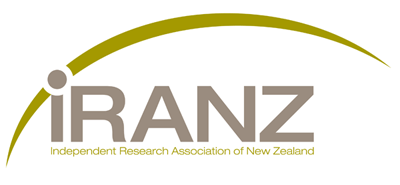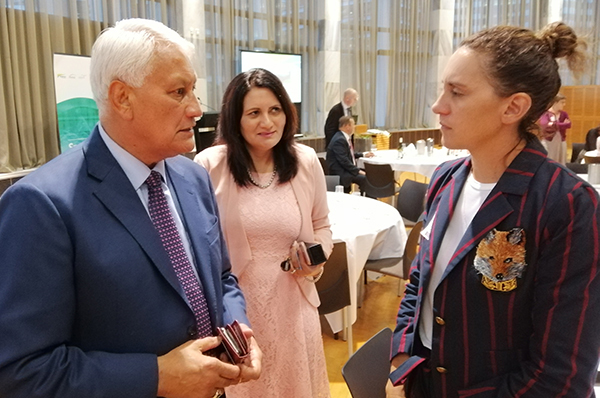IRANZ news briefs
Dr Rebekah Fuller from Lincoln Agritech, right, discusses Mātauranga Māori with MPs Mr Nuk Korako and Dr Parmjeet Parmar. Photo: Dr Rob Whitney.
2019 Speaker’s Science Forum
Dr Rebekah Fuller from Lincoln Agritech presented at the first 2019 Speaker’s Science Forum, which was held in the Banquet Hall at the Beehive on Wednesday, 13 March. The topic of the forum, which was attended by 20 MPs, was Mātauranga Māori. Rebekah is a research scientist in the Microbial Biotechnology group and spoke on Nāku te rourou nāu te rourou, ka ora ai te iwi - With your food basket and mine, the people will thrive. Rebekah spoke about how Lincoln Agritech is collecting, growing, and applying Trichoderma strains on seedlings in the Minginui Nursery owned by Ngāti Whare, and how the conversation is changing from ownership of IP associated with genetic resources towards kaitiakitanga (guardianship or management) and what that would mean for future generations.
See here for a copy of Rebekah's presentation - Naku te rourou nau te rourou, ka ora ai te iwi: Acknowledging IP from both baskets: Mātauranga Māori and Western Science.
See also: Nitrogen fixing pines and grasses.
New Motu Exec Director
IRANZ welcomes Dr John McDermott to the Independent Research Organisation community as he moves to take up the reins at Motu this month. Dr McDermott is well known in New Zealand and internationally as a macroeconomist. In his most recent appointment he was the Assistant Governor and Chief Economist at the Reserve Bank of New Zealand: Te Pūtea Matua.
Future of Canterbury's water supply
IRANZ Chair and Aqualinc CEO, John Bright, is quoted in the Christchurch Press on the future of Canterbury's water supply. Will it be business as usual for the Canterbury Plains or will some land use changes create a better future for the area? John commented that Canterbury still depends on tapping its groundwater and that Canterbury Water Management Strategy (CWMS) hasn't built the large-scale dams that could trap enough alpine water to replace that. Read more in IRANZ News.
CSST supports NZ Aerospace Challenge
The Centre for Space Science Technology (CSST) is supporting this year’s New Zealand Aerospace Challenge, which is seeking New Zealand’s brightest minds to create a solution to a worldwide problem using satellite and UAV technology. Participants will design and build a cutting-edge product or service using satellite and unmanned aerial vehicle technology to enable sustainable water and soil management in the agritech sector. Read more in IRANZ News.
Safe and Healthy Streets in South Auckland
Mackie Research is continuing to lead work to improve transport outcomes in South Auckland. The MBIE-funded and Gold-rated Future Streets research programme has demonstrated how neighbourhood streets can be re-designed to achieve a wider set of outcomes for communities including safety, health, climate change, and economic benefits focussing on improved infrastructure for safe walking and cycling. The research is having significant impact and Government is now looking to expand the concepts across South Auckland. Mackie Research is continuing to advise on this new government initiative, called Safe and Healthy Streets South Auckland, and is planning ongoing research to better understand how socio-technical system change can accelerate re-design of streets in our towns and cities.
Lincoln Agritech renews MOU with NATESC
On 15 November, Lincoln Agritech renewed a MOU with NATESC (the Chinese National Agro-Technical Extension and Service Centre) building on a relationship instigated in June 2016 when the two parties signed a “Sino-NZ Technical Cooperation on Water-Saving Agriculture” agreement. Lincoln Agritech and NATESC’s goal is to develop water-saving agricultural tools, improve efficiency of water and fertiliser use, buffer constraints in water resource shortage, and facilitate sustainable agriculture by implementing technology exchange in research areas such as soil moisture monitoring, smarter irrigation, fertigation, dryland farming, and soil and water conservation.
IRANZ CEOs meet at Malaghan
IRANZ CEOs met at Malaghan Institute for their quarterly meeting. Items on the agenda were the Government’s new R&D tax and new Research Science and Innovation Strategy, MPI’s the Sustainable Food and Fibre Futures funding programme,and the new the Research Charter of Aotearoa New Zealand being facilitated by the Royal Society of New Zealand.
Graham LeGros, Malaghan CEO, gave members a tour of the Malaghan Institute which now employs over 100 staff. Highlights included the Cell Technology Suite sponsored by the Hugh Green Foundation with state-of-the-art cell analysis, and the GMP (Good Manufacturing Processes) laboratory which is more sterile than an operating theatre, has many features that set it apart from other laboratories and significantly enhances their capacity to undertake clinical trials of vaccine therapies against cancer.
Date posted: 15 March 2019

